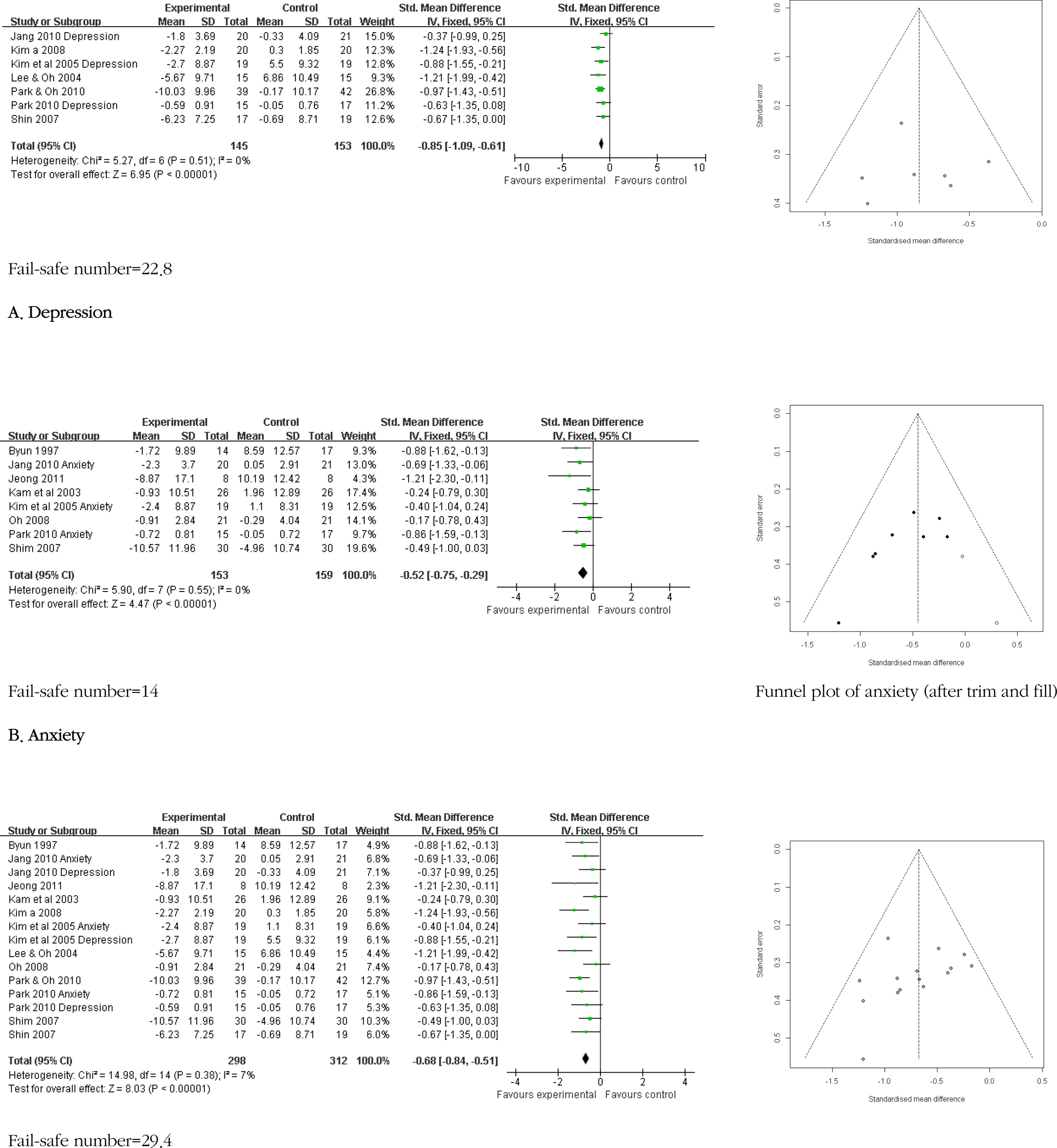Korean J Adult Nurs.
2013 Aug;25(4):377-388.
Cognitive Behavioral Therapy for Psychological Distress, Self Care and Quality of Life in Patients with Cancer: A Meta-analysis
- Affiliations
-
- 1Department of Nursing, Sahmyook University, Seoul, Korea. ohpj@syu.ac.kr
- 2Department of Nursing, Graduate School, Sahmyook University, Seoul, Korea.
Abstract
- PURPOSE
The purpose of this study was to assess the effects of cognitive behavioral therapy (CBT) on depression, anxiety, self care behavior and quality of life in cancer patients.
METHODS
Two thousand and eighty three abstracts were identified through six electronic databases (1980 to June 2012) in Korea. Seventeen studies involving 679 participants met the inclusion criteria for meta analysis. Two authors independently assessed trial quality by Cochrane's Risk of Bias and Methodological Items for Non Randomized Studies and extracted data. The data were analyzed by the RevMan 5.2 program of Cochrane library.
RESULTS
Overall, study quality was moderate to high. CBT was conducted for a mean of 4.2 weeks, 7 sessions and an average of 36.1-minutes per session. CBT was effective for depression (d=-0.85; 95% CI=-1.09, -0.61), anxiety (d=-0.52; 95% CI=-0.75, -0.29), self care behavior (d=-1.34; 95% CI=-1.93, -0.74), and quality of life (d=-0.42; 95% CI=-0.80, -0.04). Publication bias was not detected as evaluated by funnel plot and Egger's test.
CONCLUSION
CBT has small to large effects on depression, anxiety, self care and quality of life. These finding suggests that various CBT interventions can assist cancer patients in reducing emotional distress and improving self care and quality of life.
Figure
Reference
-
Cohen J.1988. Statistical power analysis for the behavioral science. 2nd ed.Hillsdale, NJ: Lawrence Erlbaum Associates.Egger M.., Smith G. D.., Schneider M.., Minder C.1997. Bias in meta-analysis detected by a simple graphical test. British Medical Journal. 315:629–634. http://dx.doi.org/10.1136/bmj.315.7109.629.
ArticleGalway K. M.., Black A.., Cardwell C. R.., Mills M.., Donnelly M.2008. Psychosocial interventions to improve quality of life and emotional wellbeing for recently diagnosed cancer patients. (protocol). Cochrane Database of Systematic Reviews, 2. http://dx.doi.org/10.1002/14651858.Goedendrop M. M.., Gielissen M. F.., Verhagen C. A.., Bleijen-berg G.2009. Psychosocial intervention for reducing fatigue during cancer treatment in adults. Cochrame Database of Systemic Review. 1:http://onlinelibrary.wiley.com/doi/10.1002/14651858.CD006953.pub2/pdf.Goodinson S. M.., Singleton J.1989. Quality of life: A critical review of current concepts, measures and their clinical implication. International Journal of Nursing Studies. 26:327–341.Hersch J.., Juraskova I.., Price M.., Mullan B.2009. Psychosocial interventions and quality of life in gynecological cancer patients: A systematic review. Psychological Oncology. 18:795–810.Hodges L. J.., Walker J.., Kleiboer A. M.., Ramirez A. J.., Richardson A.., Velikova G., et al. 2011. What is a psychological intervention? A metareview and practical proposal. Psychological Oncology. 20:470–478. http://www.ncbi.nlm.nih.gov/pubmed/20878870.
ArticleJassim G. A.., Whitford D. L.., Grey I. M.2010. Psychological interventions for women with non-metastatic breast cancer (Protocal). Cochrane Database of Systematic Reviews. 10:http://onlinelibrary.wiley.com/doi/10.1002/14651858.CD008729/full.Kim J. N.., Lee R.2008. A review of research on the psychosocial interventions for the cancer patients. Korean Journal of Health Psychology. 13:329–357.Kim S. Y.., Park J. E.., Seo H. J.., Lee Y. J.., Son H. J.., Jang B. H., et al. 2011. NECA's guidance for undertaking systematic reviews and meta-analysis for intervention. Seoul: National Evidence-based Healthcare Collaborating Agency.Meyer T. J.., Mark M. M.1995. Effects of psychosocial interventions with adult cancer patients: A meta-analysis of randomized experiments. Health Psychology. 14:101–108.
ArticleNational Cancer Information Center. 2013, January. Cancer statistics. Retrieved January 30, from. http://www.cancer.go.kr/ncic/cics-f/03/032/index.html.Newell S.., Sanson-Fisher R. W.., Savolainen N. J.2002. Systematic review of psychological therapies for cancer patients: Overview and recommendations for future research. Journal of the National Cancer Institute. 94:558–584.
ArticleOh P. J.., Choi H. J.2012. The effect of patient education interventions on distress, self-care knowledge and self-care behavior of oncology patients: A meta-analysis. Asian Oncology Nursing. 12:257–266.
ArticleOh P. J.2010. An integrative review of oncology nursing research in Korea: 2003-2008. Journal of Korean Oncology Nursing. 10:80–87.Oh S. S.2009. Meta-analysis: Theory and practice. Seoul: Konkuk University Press.Osborn R. L.., Demoncada A. C.., Feuerstein M.2006. Psychosocial interventions for depression, anxiety, and quality of life in cancer survivors: Meta-analyses. International Journal of Psychiatry in Medicine. 36:13–34.
ArticleRaingruber B.2011. The effectiveness of psychosocial interventions with cancer patients: An integrative review of the literature (2006-2011). International Scholarly Research Network Nursing;http://dx.doi.org/10.5402/2011/638218.Ranchor A. V.., Fleer J.., Sanderman R.., Van der Ploeg K. M.., Coyne J. C.., Schroevers M.2012. Psychological interventions for cancer survivors and cancer patients in the palliative phase. Cochrane Database of Systematic Reviews. 10:http://onlinelibrary.wiley.com/doi/10.1002/14651858.CD009511/abstract?deniedAccessCustomisedMessage=&userIsAuthenticated=false.
ArticleRehse B.., Pukrop R.2003. Effects of psychosocial interventions on quality of life in adult cancer patients: Meta analysis of 37 published controlled outcome studies. Patient Education and Counseling. 50:179–186.
ArticleSchneider S.., Moyer A.., Knapp-Oliver S.., Sohi S.., Cannelia D.., Targhetta V.2010. Pre-intervention distress moderates the efficacy of psychosocial treatment for cancer patients: A meta-analysis. Journal of Behavioral Medicine. 33(1):1–14. http://dx.doi.org/10.1007/s10865-009-9227-2.
ArticleSheard T.., Maguire P.1999. The effect of psychological interventions on anxiety and depression in cancer patients: Results of two meta-analyses. British Journal of Cancer. 80:1770–1780.
ArticleSchwarzer G.2013. Meta: Meta-analysis with R. R package version 2.15.3. http://CRAN.R-project.org/package=meta.Uitterhoeve R. J.., Vernooy M.., Litjens M.., Potting K.., Bensing J.., Mulder P. D., et al. 2004. Psychosocial interventions for patients with advanced cancer-a systematic review of the literature. British Journal of Cancer. 91:1050–1062.Williams S.., Dale J.2006. The effectiveness of treatment for depression/depressive symptoms in adults with cancer: A systematic review. British Journal of Cancer. 94:372–390.
Article
- Full Text Links
- Actions
-
Cited
- CITED
-
- Close
- Share
- Similar articles
-
- Psychological Aspects of Care in Cancer Patients in the Last Weeks/Days of Life
- Psychosocial Aspects and Mental Health in Cancer Patients
- Distress and Quality of Life in Breast Cancer Survivors in Korea
- Update on distress management for cancer patients
- Chemotherapy-related Cognitive Impairment and Quality of Life in People with Colon Cancer: The Mediating Effect of Psychological Distress





